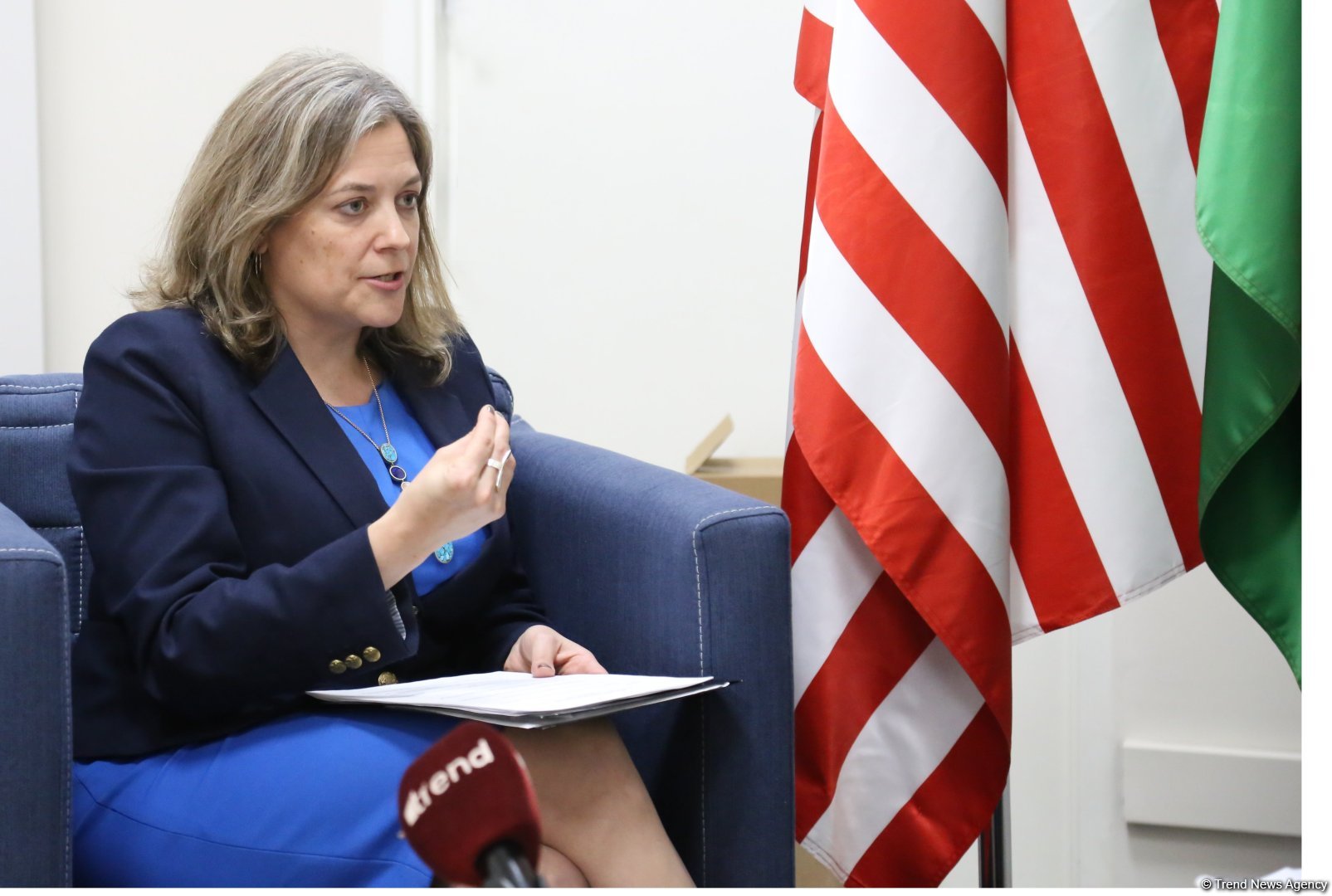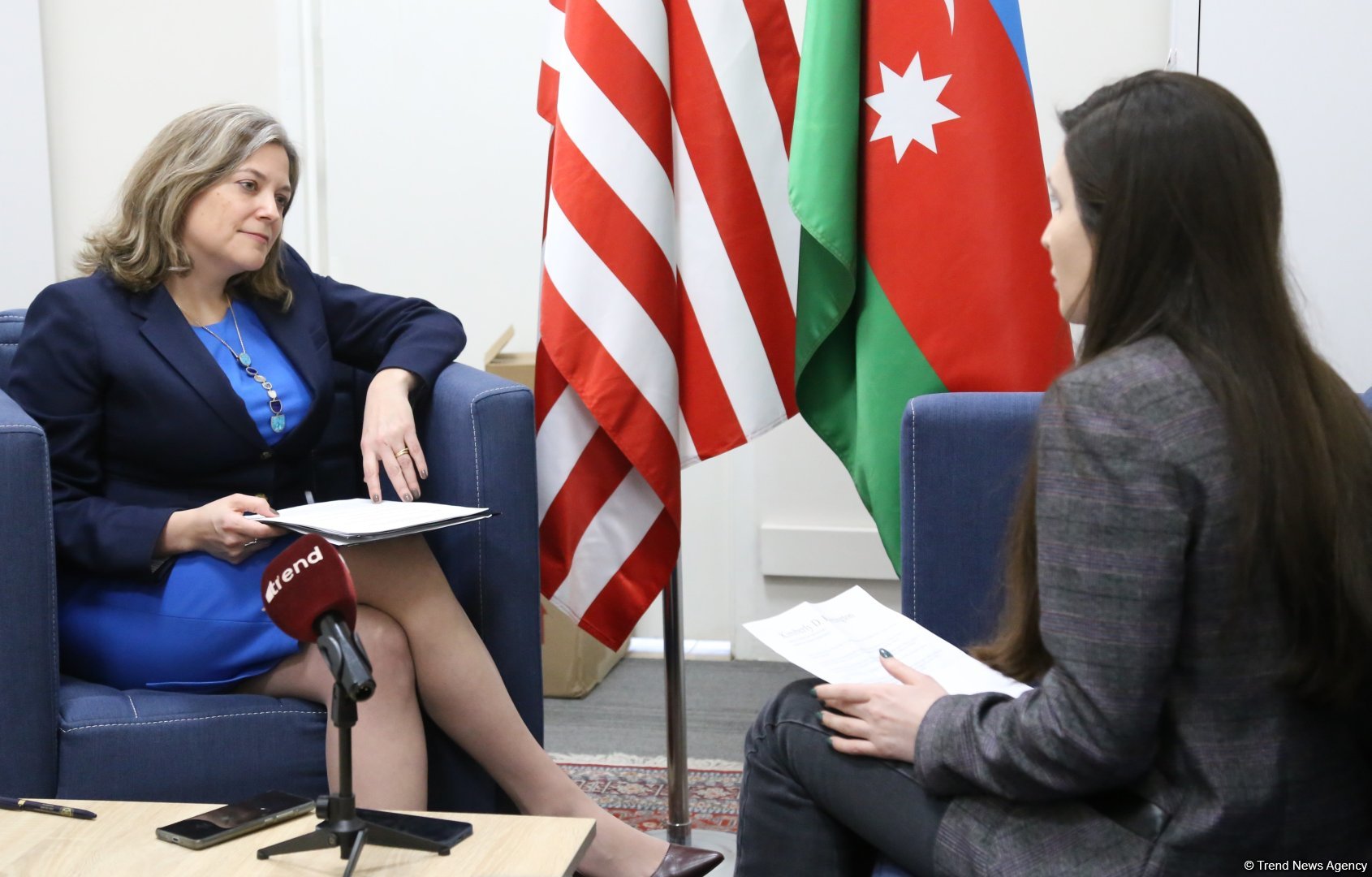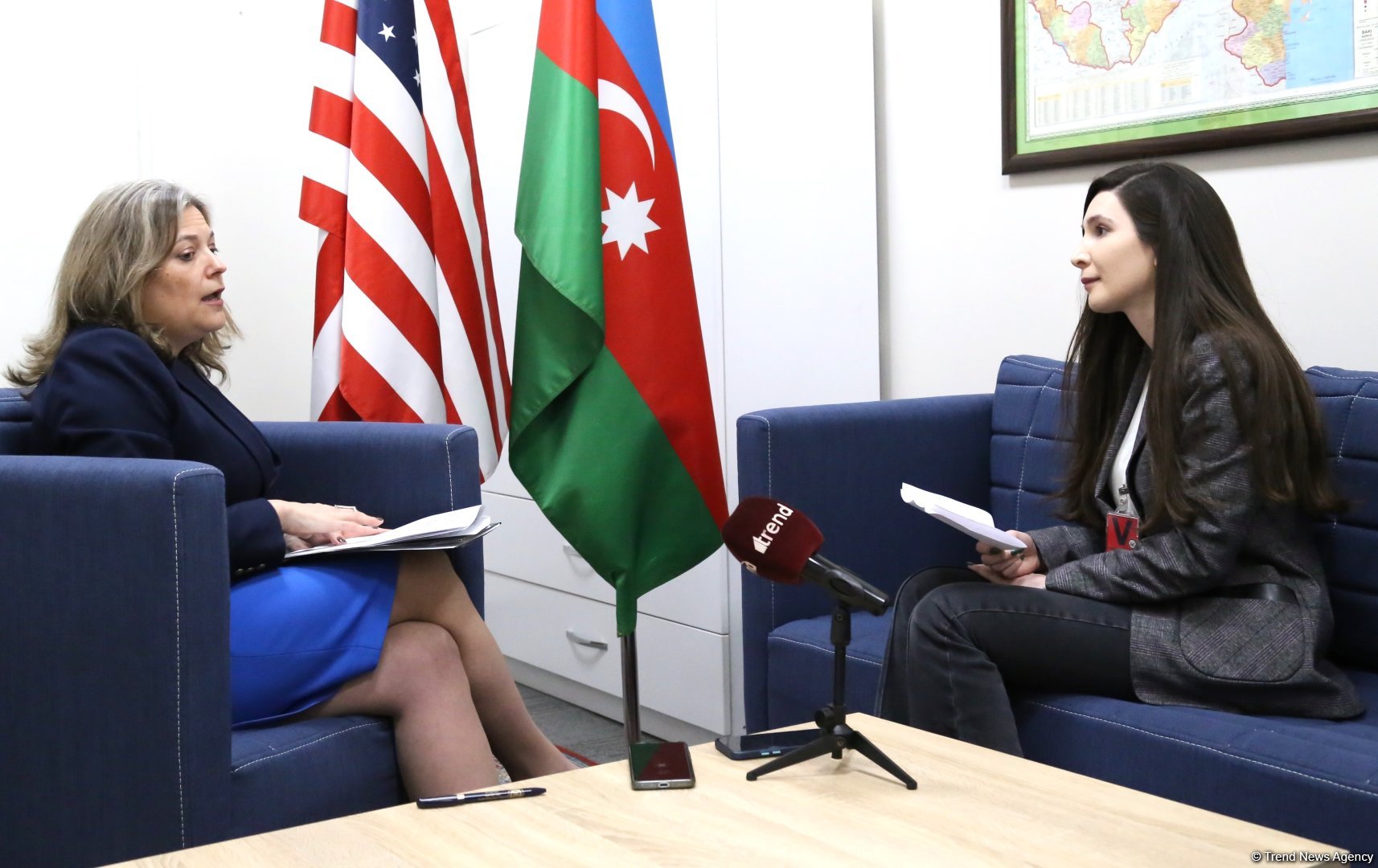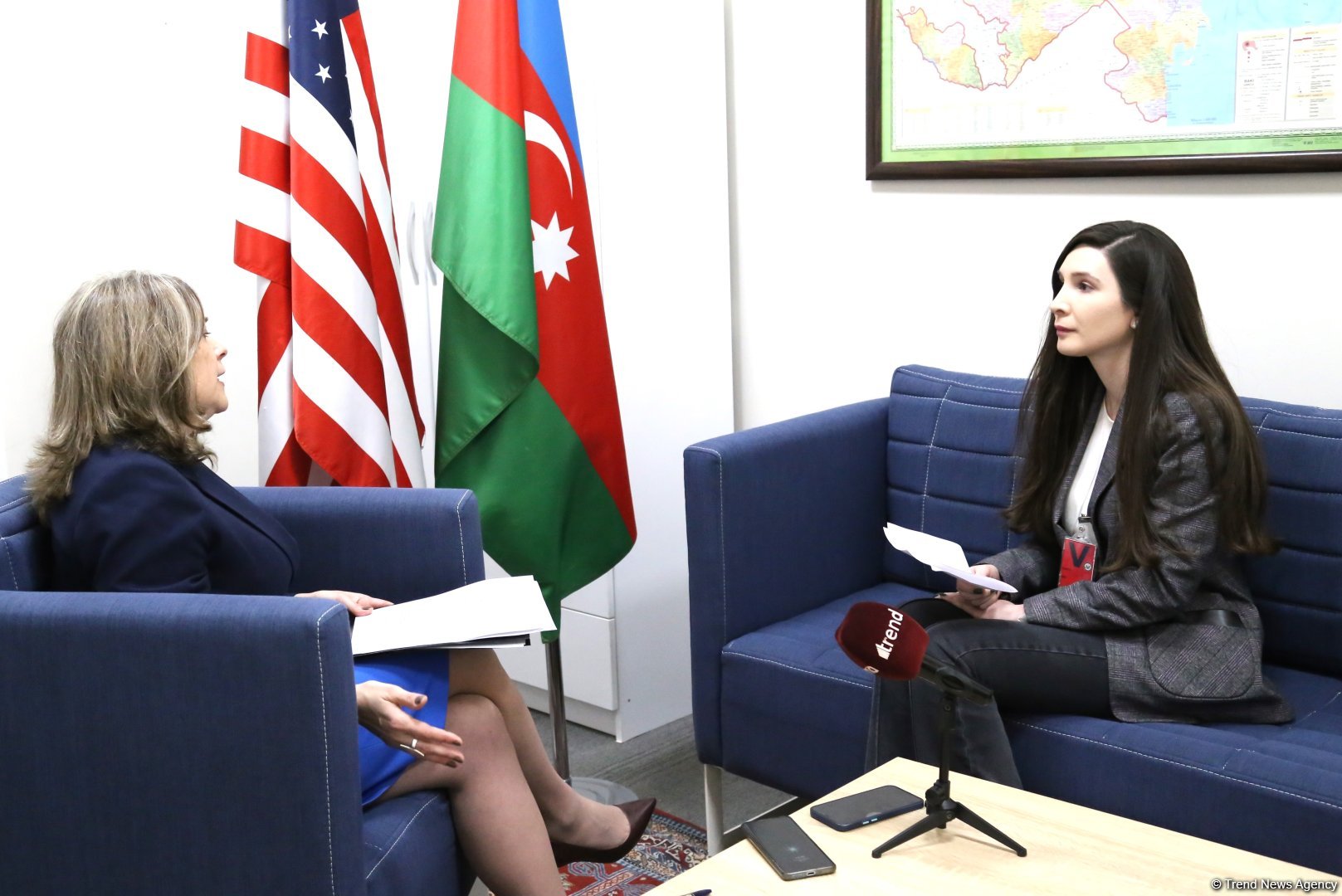BAKU, Azerbaijan, March 1. As the COP29 host, Azerbaijan has a tremendous opportunity to help world keep tackling methane emissions, Kimberly D. Harrington, Deputy Assistant Secretary for the Bureau of Energy Resources of the US State Department, said in an exclusive interview with Trend, as she has visited Baku to take part in the 10th meeting of the Southern Gas Corridor Advisory Council.
"It's a real pleasure to be here. This is my first trip to Azerbaijan. So, it's exciting for me. But I want to take a step back and just explain a little bit about what the Bureau of Energy Resources does and how we got here, why I'm at this ministerial. The Bureau of Energy Resources serves at the nexus of energy security, decarbonization, and energy access for the State Department. One of our first projects that we really pushed, that was foundational to the creation of our bureau was the Southern Gas Corridor. We always say that Azerbaijan is in the DNA of our bureau, and it truly is. Now between the ministerial and Azerbaijan hosting COP, these two foundational goals are centered here in Baku. It's really delightful to be here. The US government is very proud of the role that it had for over a decade in supporting the Southern Gas Corridor and, of course, its final stages of becoming fully operational in 2020," she said.
Harrington noted that she was at Sangachal, and saw the pipeline, which is signed by a number of officials, including one from the US government.
"I think that it just goes to show that a long-term goal of our bureau has been to bolster energy security in the region. And that really means diversifying routes and diversifying access, so that no country is overly dependent on a single source for its energy resources. Europe very rightly has some important goals to wean itself off Russian oil and Russian gas. In fact, one of its primary goals is to wean itself off Russian gas completely by 2027. The more diversity of resources, the more they can help advance that goal and we see the Southern Gas Corridor as part of that. I think there's still work to be done for Europe to be able to achieve that goal. But, in short, our goals with the Southern Gas Corridor now are the same as they were a decade ago when the bureau was founded to diversify energy resources for our partners and allies," she said.
Southern Gas Corridor's expansion
Harrington pointed out that the US certainly supports the expansion of the Southern Gas Corridor, and certainly supports Azerbaijan and the EU agreeing to double gas exports and sees the Southern Gas Corridor as obviously foundational to achieving that goal.
"European energy security is only bolstered by diversification and bolstered by more routes, enhanced routes like the Southern Gas Corridor. We really want to make sure that our partners and allies are not subject to the weaponization of energy as we have seen. We've seen more interconnectors come online in Europe recently, including the interconnector Greece-Bulgaria by which Azerbaijani gas is flowing. The more Azerbaijani gas gets to more parts of Europe, the better as far as we're concerned. That connector is operating in an area where Russia had a near monopoly before. We'll continue to really support these efforts. And we think this expansion of Azerbaijani gas is going to make a difference for a lot of countries," she said.
Cooperation in green energy
DAS Harrington noted that the US really sees Azerbaijan as having tremendous potential with solar and with wind.
"As I can tell, I was standing out of the Caspian yesterday, and I could feel the wind. It's very, very obvious. Deploying renewables has so many benefits, not just to our decarbonization goals, but it also frees up molecules that might be used in domestic market, to export overseas. There's a lot of benefits, and renewables and supporting renewables is foundational to what we do.
I've been in Baku for a number of days now, so I've had the chance to discuss some of these goals with officials. I was just in a meeting with Azerbaijan's Energy Minister Parviz Shahbazov. We talked a little bit about the green energy corridor concept. We absolutely are interested in learning more and looking to see how we might be able to support these ambitious plans. And I would say, Azerbaijan has pulled off some pretty impressive major infrastructure projects before - Baku-Tbilisi-Ceyhan, Southern Gas Corridor. It's not going to be easy to pull off another major green energy corridor. I have to say, these connectors are not going to be easy, but if anyone can prove that the doubters are wrong, it's Azerbaijan, because Azerbaijan has done it in the past," she added.
Harrington noted that expansion of cooperation in renewables is absolutely an area the US is looking forward to expanding with Azerbaijan.
"Domestically in the United States, we've taken a lot of really important measures under the Biden administration to advance the deployment of clean energy, to advance the deployment of renewables. These include underpinning legislation, like the Bipartisan Infrastructure Act, Inflation Reduction Act, CHIPS and Science Act. These are really turbocharging clean energy research and development in the United States. Minister Shabazov recently had the chance to visit the National Renewable Energy Labs in Colorado, and he discussed ways to increase our cooperation on renewables with our partners from the Department of Energy there. So, as Azerbaijan deploys more renewables, we stand ready to partner, to ensure that these deliverables can immediately deliver electricity to the citizens of Azerbaijan and beyond.
I'd say one area that comes to mind more specifically, though, where we might be able to partner, and which makes a lot of sense given that the UAE just hosted COP and Azerbaijan is about to host COP, is leveraging the partner that the United States has with the United Arab Emirates. It's called the Partnership for Accelerating Clean Energy. It was established in 2022, and it aims at catalyzing $100 billion in green energy investment and support for clean energy projects around the globe by 2035," she said.
DAS Harrington believes that given Masdar's partnerships and really committed demonstration to working here in Azerbaijan in the renewables market, the three-way collaboration between the United States, Azerbaijan, and the UAE in this sphere holds a lot of possibilities.
Expectations from COP29
"First of all, I want to congratulate Azerbaijan for hosting COP. It's in fact an incredibly important COP as we continue to really suffer from the impacts of the climate crisis around the world and see more extreme weather events occurring each and every year. So I think it's important. This COP is incredibly important as we look to preserve the climate for future generations. One of the big priorities for this COP, I would say, is maintaining the momentum from the last COP28. And there were a couple of commitments that were particularly important that were underscored at COP28.
First of all, the tripling of renewable energy by 2030, second is a doubling of efficiency by 2030. And of course, this COP was the first time that leaders committed to transition away from fossil fuels completely in the future. So there's still a lot of work ahead of us to keep the 1.5 goal alive and within reach. But I think COP28 put us one step closer. I'd say as well that as the host of COP 29, Azerbaijan has a tremendous opportunity to help the world keep tackling methane," she said.
Harrington went on to add that methane supercharges climate change.
"It's 80 percent more potent than CO2. Its impacts on climate change really are significant. The good thing about methane, though, is that it doesn't last in the atmosphere as long as CO2. So if we can lower methane emissions, we really have a chance to try to keep the 1.5 degrees Celsius goal alive. Of course, methane doesn't just come from the oil and gas sector. It comes from other sectors as well. However, when it comes to lowering methane emissions, the lowest hanging fruit comes from the oil and gas sector. Because really, methane emissions are in many ways a wasted resource. It's natural gas, the resource that is either being expelled into the air due to flaring, due to fugitive emissions. And really, it's a wasted economic resource," she said.
Harrington highlighted tremendous efforts being made by bp and SOCAR at Sangachal to reduce methane emissions.
"And I think this type of work is important to showcase to other oil and gas producing countries during this COP. And when I was at Sangachal, I was also particularly impressed to hear about their plans to electrify the facility and to ultimately install renewable energy to power the plant. Reducing methane emissions of the oil and gas sector and decarbonizing to the greatest extent the oil and gas sector is something that I think Azerbaijan can show tremendous leadership on. And this really goes to show how energy security and decarbonization can go hand in hand. One other thing I think is important to highlight, there's this really great initiative of the Troika, which is the UAE, Azerbaijan, and Brazil working together to connect the dots between the three COPs and to make it crystal clear to the world that none of these events are being held in isolation. They're part of ensuring continuity. I look forward to seeing all the efforts being made by the three partner countries together. One other thing I think everyone is expecting that this COP is also going to have a big focus on climate finance.
There were pledges to scale up climate finance to $100 billion. And I think it's going to be a critical opportunity here in Azerbaijan to advance this goal, to expand climate action around the world. And I think we're going to see Azerbaijan's priorities come forward more clearly in the next few months. We are really excited to see what renewable initiatives and other initiatives they plan to highlight," she concluded.
Follow the author on X: @Lyaman_Zeyn














